"Language Zen" - Learning Spanish - A Review
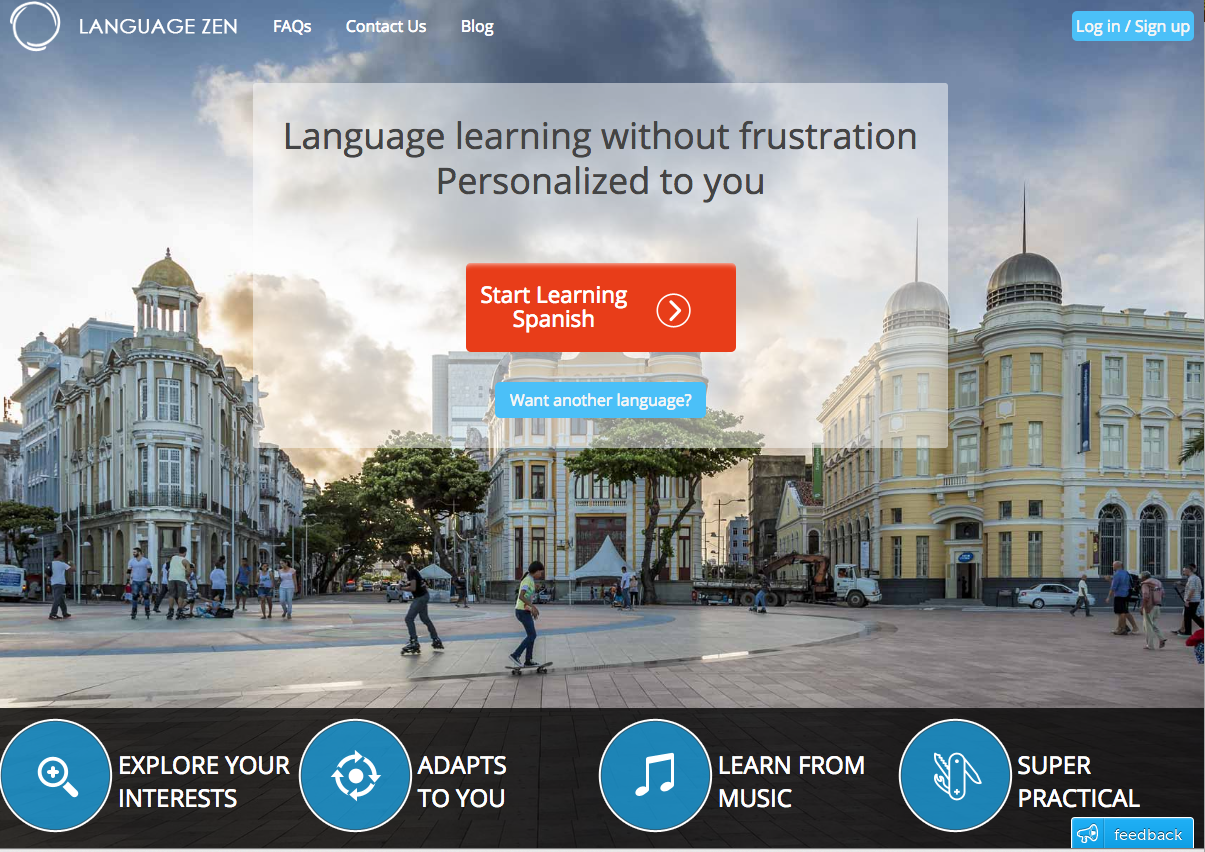 Language Zen is a language learning site that features Spanish for English speakers. Its home page promises: “Language learning without frustration. Personalized to you.”
Language Zen is a language learning site that features Spanish for English speakers. Its home page promises: “Language learning without frustration. Personalized to you.”
Frustration is sometimes unavoidable when you're learning and are annoyed by your mistakes. However, learning a foreign language with a program that adapts to your learning style and skill level is clearly the way to go.
At the center of Language Zen's program is the algorithm that keeps track of what you've learned and has you redo the phrases and sentences where you made mistakes.
What you learn are the most frequently used words, which Language Zen gathers through “data mining” - analyzing thousands of TV transcripts.
A special feature of Language Zen is that you can learn with songs and use the song lyrics for learning vocabulary. The program promises: “The system gets smarter the more you use it. If you learn something through a song or a special course, it will carry over to the rest of the system.”
Let's see how it works!
ASSESSMENT TEST
Once you've registered and clicked on “Start Learning,” you can do an Assessment Test to determine your level: Beginner, Beginner Plus, Intermediate, Intermediate Plus, Advanced, Advanced Plus, Fluent, Near Native.
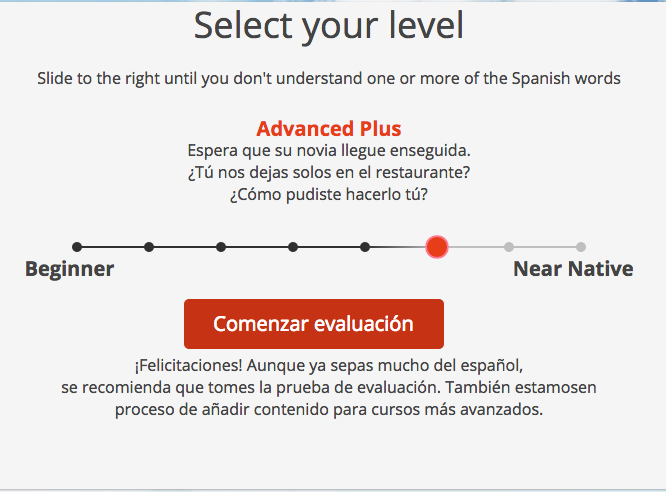 To find your level for the test,you're asked to “Slide to the right until you don't understand one or more of the Spanish words.” [see screenshot, right]
To find your level for the test,you're asked to “Slide to the right until you don't understand one or more of the Spanish words.” [see screenshot, right]
The test is based on translation, always into the target language. For my level, I slid into Advanced Plus.
The test of 20 sentences that followed included various verb tenses and idiomatic ways of saying things. I did not come across any uncommon or specialized language.
For the translations, I could speak or write the answer. An option for a “literal” cue provided some help. Then, for each answer I got corrections and brief explanation. So I was already learning during the test.
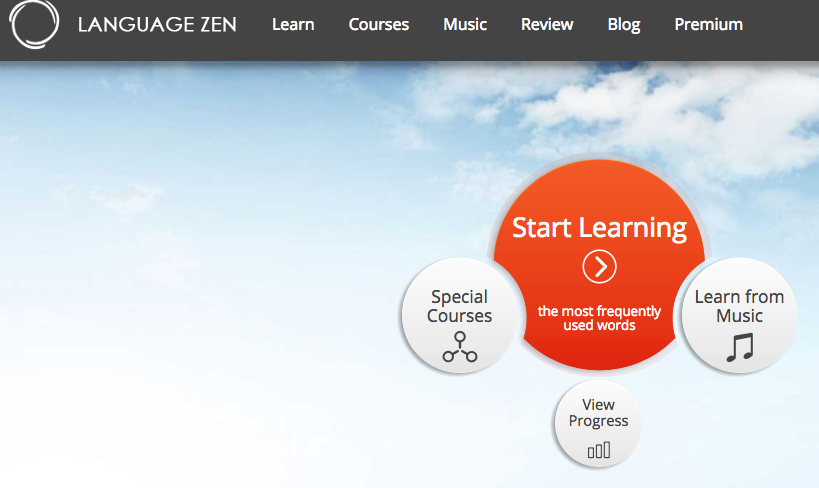 After completing the test, I was indeed assessed to be Advanced Plus. But that doesn't tell me that everything I did was perfect. It simply means that I'll do my best learning in the advanced language environment.
After completing the test, I was indeed assessed to be Advanced Plus. But that doesn't tell me that everything I did was perfect. It simply means that I'll do my best learning in the advanced language environment.
Language Zen is a bright,uncluttered, inviting site, and easy to navigate. On the Bar on top, you see: Learn, Courses, Music, Review, Blog, Premium
LEARN (or Start Learning)
When you start, you learn at the level you've reached.
There are three types of exercises:
1. Write or speak the translation of a sentence into the target language. Once you've done that, you'll hear the right answer and get corrections. From time to time, you'll get a grammatical hint.
2. Listen to a sentence in the target language and choose the correct translation out of five. Again, you'll see and hear the correct answer so you can check.
3. Match the meanings of 5 words or phrases.
At the end of each section, you'll see your progress.
COURSES (or Special Courses)
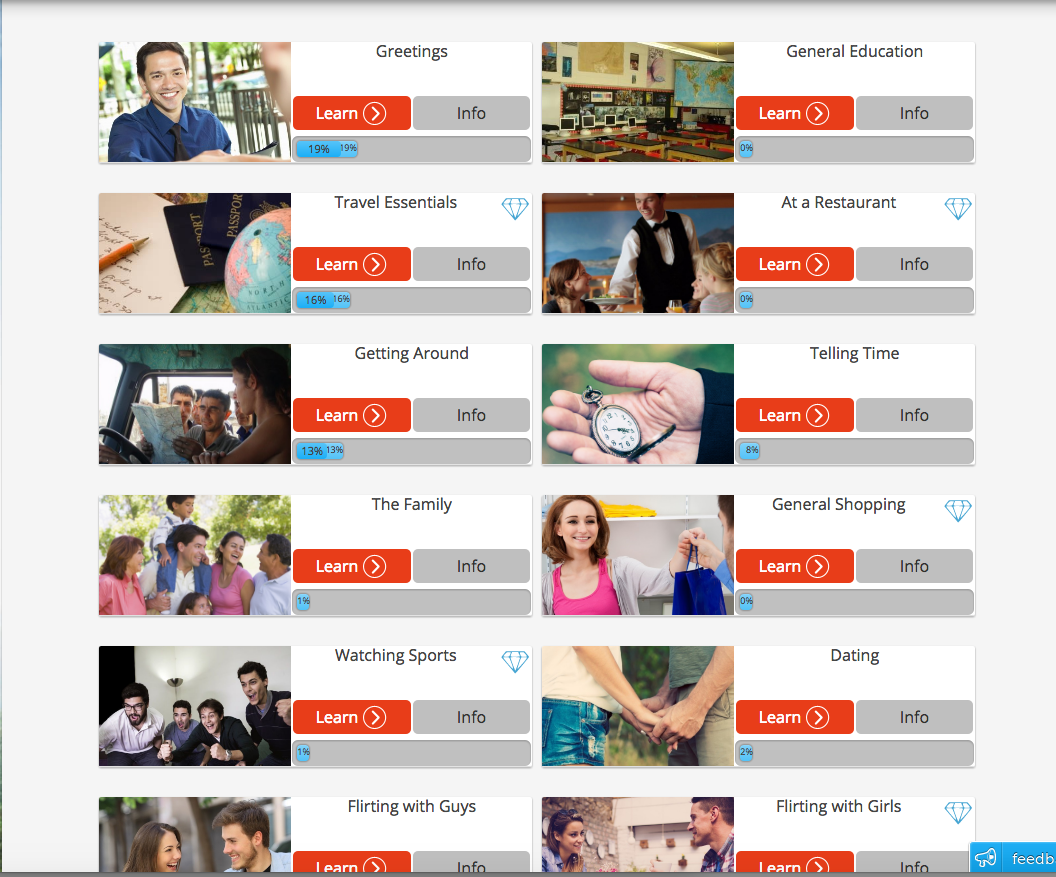 Here you have a list of 13 specific topics: Greetings, General Education, Travel Essentials, At a Restaurant, Getting Around, Telling Time, The Family, General Shopping, Watching Sports, Dating, Flirting with Girls, Flirting with Guys, and Investing in Startups.
Here you have a list of 13 specific topics: Greetings, General Education, Travel Essentials, At a Restaurant, Getting Around, Telling Time, The Family, General Shopping, Watching Sports, Dating, Flirting with Girls, Flirting with Guys, and Investing in Startups.
With the 4 hours I had done in the “Learn” section, I could see the percentage of words that I knew in each of these courses (without yet doing any of the courses).
The last course “Investing in Startups” caught my eye. The Info Tab tells you: “Language Zen is starting its first raise. As a treat for our investors and potential investors, we've built a course to help you talk about investing in the next great Latin American startup.” The learning method is similar to what I've been doing in the “Learn” section.
Learning from your mistakes is part of the method: For example, I translated the sentence “I like working with VCs” with: “Me gusta trabajar con VVCC.” (Because I had previously learned that you make abbreviations plural by doubling the letter, as in EEUU (United States).
However, the correct answer is: “Me gusta trabajar con VC,” which is something I will now remember. Deeper into the course, I also learned the Spanish for VCs - “inversores de riesgo."
I really like getting the corrections, sometimes with a brief explanation of why my answer was wrong.
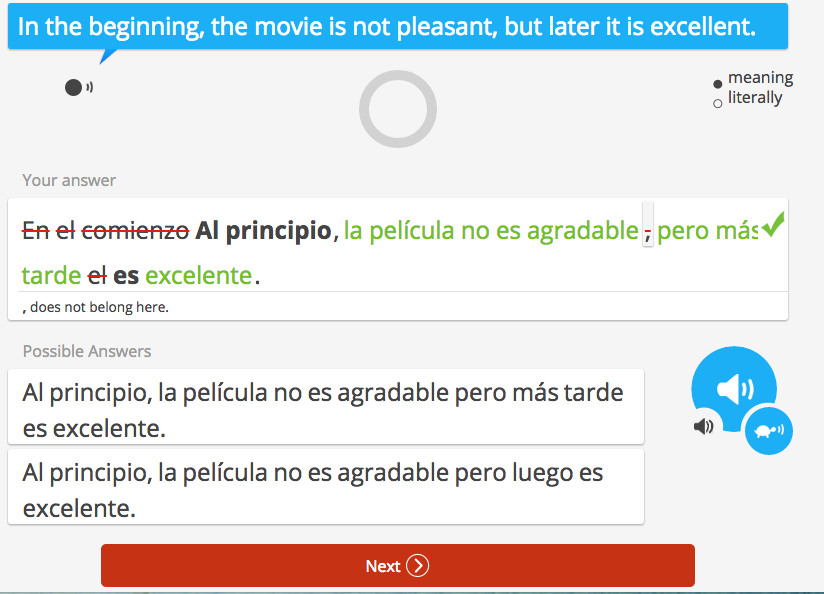 Recording the answer is a really cool option. When you speak your translation, it appears automatically as written. You can still correct the written form before you “check” it.
Recording the answer is a really cool option. When you speak your translation, it appears automatically as written. You can still correct the written form before you “check” it.
However, as with many voice recognition features, this one sometimes doesn't work that well for me.
I spoke the sentence “¿Cuánta pista tienen?” (How much runway do you have?) - and the program wrote: “autopista kennedy.”
My husband, who was listening, commented that maybe my Austrian accent in Spanish didn't go over that well. But then, who doesn't have some kind of accent when learning a foreign language?
I've noticed, though, that the program has become more accepting of my voice, with fewer strange transcriptions. That means it's learning too!
MUSIC (Learn from Music)
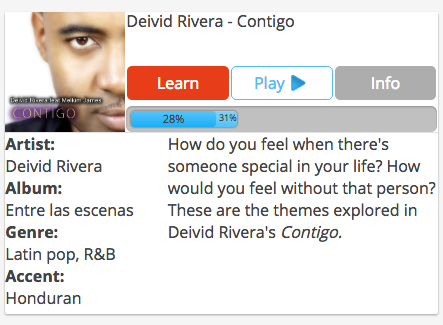 I love learning with songs. Because, there's lots of repetition, songs become a surprisingly effective way to learn vocabulary, idiomatic phrases, grammar structures, and the pronunciation of difficult sounds.
I love learning with songs. Because, there's lots of repetition, songs become a surprisingly effective way to learn vocabulary, idiomatic phrases, grammar structures, and the pronunciation of difficult sounds.
For many language enthusiasts learning the lyrics of a foreign song is a great way to engage both with the music and the language. (No wonder that La Paloma Lyrics - Learning Spanish With a Song, is still one of our most-read blog posts!)
For Spanish, 15 songs are listed. Next to the song titles, you see the percentage of its words that you have already learned in another context on the site. Each song has three Tabs: Info, Play, Learn
1. The Info Tab lists the Artist, Album, Genre, and Accent: Spanish (Peninsular), Dominican, Honduran, Colombian, Mexican, American, Andalusian (Peninsular), Chilean, Puerto Rican.
By the way, it's a good idea to listen to different accents and dialects in a language. Doing so, trains your ear to hear subtle differences in sound. If you do this consistently, you'll understand native speakers of your target language much better. Especially, if they aren't your standard-accent radio announcer.
2. The Play Tab takes you to the song. You can listen to it in Spanish and see each of the lines as they're sung either in Spanish or in English.
3. The Learn Tab teaches you individual phrases that occur in the song (by having you translate or pick a translation out of multiple choice). I noticed that some of the sentences from my other course lesson also showed up, scattered in between.
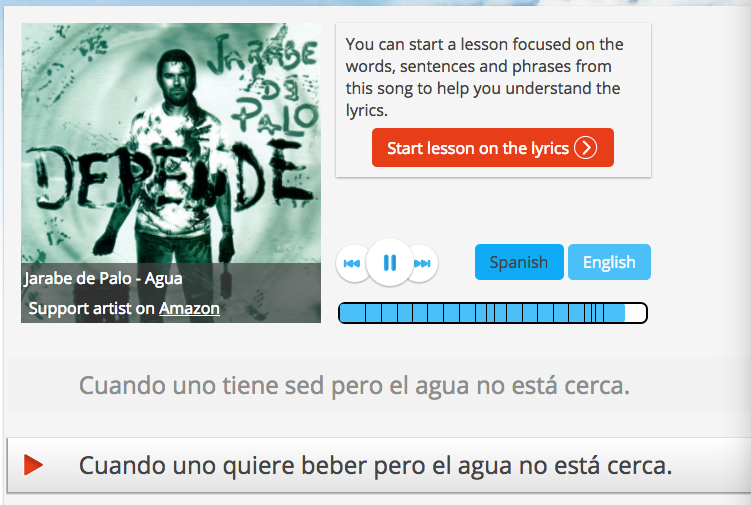 You can also just do a “lesson on the lyrics,”where you learn individual phrases that go to make up the lines of the song.
You can also just do a “lesson on the lyrics,”where you learn individual phrases that go to make up the lines of the song.
As you go along, you get quick grammar tips. For example: As you see the sentence (line of the song) “Lo oigo todo es tiempo” a small box opens and tells you: “When someone or something receives the action of a verb, that someone or something is known as the direct object of a sentence."
As you progress, you'll hear snippets of the song, where the words you're learning occur.
You slowly start building the sentences of the song. The short phrases are quite easy in themselves, but as you start putting them together into longer sentences, you learn colloquial structures that go beyond literal translation.
If you click on "More", on the bottom of the box, a page of explanation opens, giving you an extensive description of a direct object, including a list of pronoun objects, and a note about word order.
REVIEW (What you've learned)
Learning a language effectively depends a whole lot on how you review. Language Zen has some nice features in that department.
On “Review” you can pull down three options: Progress, Words, Facts
1. Progress:
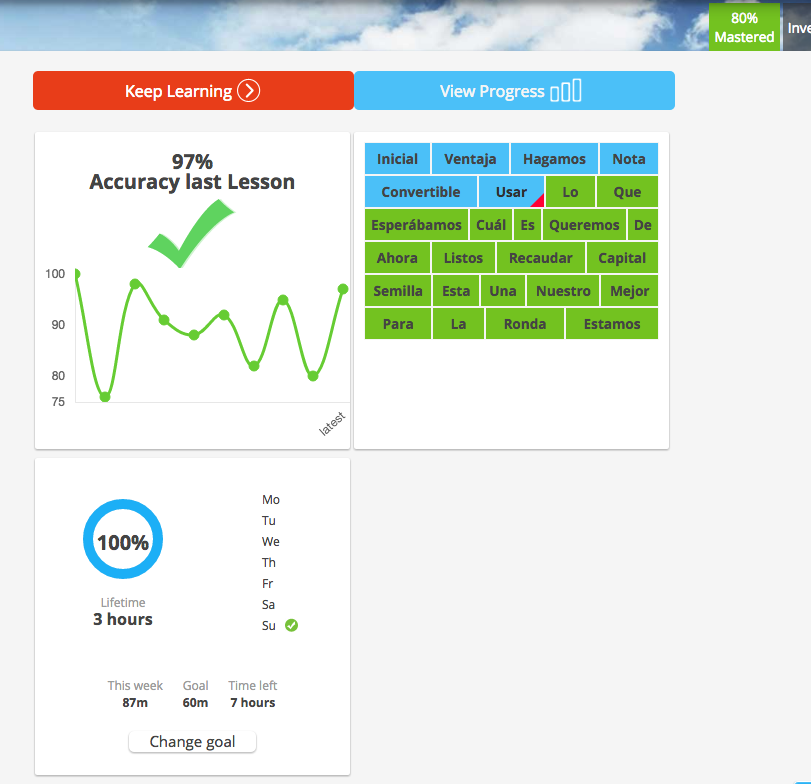 This opens a Dashboard that tells you your status: close you're to your weekly goal in hours; what you've learned in numbers and on a graph (Words, Facts, Phrases, Meanings); your streak in days; what level you're on; how many points you've earned.
This opens a Dashboard that tells you your status: close you're to your weekly goal in hours; what you've learned in numbers and on a graph (Words, Facts, Phrases, Meanings); your streak in days; what level you're on; how many points you've earned.
2. Words:
This lists all the words and their meanings that you've learned so far. You can sort by: Words I “Know / Don't Know” and “Need / Don't Need” to Practice that are “Of Any Type” or 11 other grammatical categories such as /Verbs /Nouns / Prepositions, etc.
When you see the letter P beside any of the words, it means you need to practice it; a puzzle piece beside it means there's a grammatical fact attached to it.
3. Facts:
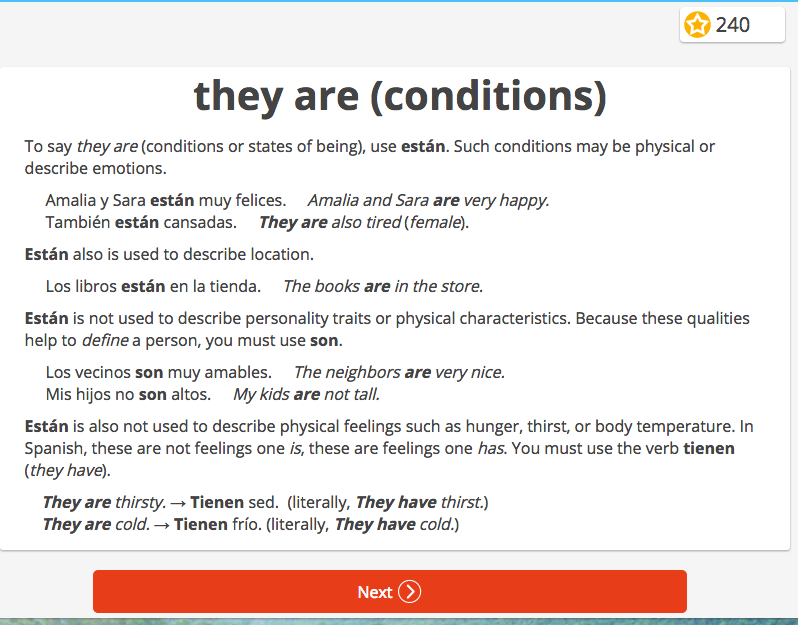 Under "Facts", you'll find a list of grammatical points that are explained in the lessons, such as “Por vs para,” “Expressions with Tener,”etc.
Under "Facts", you'll find a list of grammatical points that are explained in the lessons, such as “Por vs para,” “Expressions with Tener,”etc.
You can sort this list the same way as in the Words section. Also, you are given the skill level for each. Clicking on any of the items gives you a brief explanation and examples.
For example, in the screenshot as on the left: “they are”, the use of the verb “estar” to express “conditions” (rather than “qualities,” for which “ser” is used) is explained.
COST
Language Zen can be used for free, with ads on the site and limited daily learning.
There are also Premium monthly subscription options. Check the Membership Feature Comparison page for the various subscription options. (An option for companies and schools includes “custom professional content” and “group usage metrics.”)
What we Like
• You learn most vocabulary in the context of phrases and sentences.
• The vocabulary seems practical and useful.
• The “Special Courses” let you learn and practice what you need or want.
• Translations are always into Spanish.
• When translating a English phrase you often get several Spanish options.
• Choosing the “literally” translation option is often helpful.
• You can select a slow voice option.
• Recording your answer gives you an opportunity to speak.
• The voice recorder seems to learn and adapt to your voice.
• You choose the level to start (or rely on the assessment test).
• The recall algorithm of words I missed, seemed to work well.
• You get grammar points at times, but they are not overwhelming.
Other things to consider
• The learning and practice is translation based.
• I did not find any dialogues of conversations (beyond some of the song lyrics).
• The “Learn” and “Course” module translations are quite demanding; interspersing a song and just reading the lyrics can be relaxing.
• Language Zen has found a very effective way of using its teaching method for song lyrics. We find the method both engaging and demanding.
• It really requires you to be on your toes to get the translations correctly – one sure way you are learning!
• There are no iOS or Android apps yet but we understand that an Android app is in the works, to be followed by an iOS app.
• Conversations and stories, using a similar method as for the song/lyrics module, are also in development and will be added shortly.
Brief Comparison with Lingualia
In April we reviewed the Spanish program (online and apps) of our partner site Lingualia. Lingualia also uses a learning algorithm and adjusts to your skill level. Here are features in which Lingualia differs from Language Zen:
• Lingualia's exercises are all in Spanish (without any English/Spanish translations).
• Definitions are in Spanish and you are often given Spanish synonyms and antonyms for words you're learning.
• Each lesson starts with a rapidly spoken dialogue. You can listen to it as many times as you want.
• If needed, you can click to activate Google translate for dialogues and example sentences (and have to live with the often literal and incorrect Google translations).
• Grammar points are taught in the form of exercises, with explanations in Spanish.
• Texts in Spanish and questions for reading comprehension are mixed in.
• Both the iOS and Android Lingualia apps work well with the online account.
Both sites are good examples for how different programs can be used for developing and practicing different skills.
Which one is more effective for you, may well depend on which method and topics engage you the most. You'll want a site to which you come back again and again to learn and practice - the only sure way to progress.
If translating, special courses and vocabulary, Spanish songs and lyrics, etc. are your thing, then Language Zen will work very well for you.
And you can read about our Update on Language Zen.
Bio: Ulrike Rettig is the co-founder of :GamesforLanguage.com. She is a life-long language learner, growing up in Austria, the Netherlands and Canada. You can follow her on Facebook, Twitter and Instagram, and leave any comments with contact.
Disclosure: The link to Lingualia is to a partner's program with revenue-sharing, should you decide to subscribe. Gamesforlanguage had no business relationship with Language Zen when the review was written, other than having received a short free subscription for the course.
